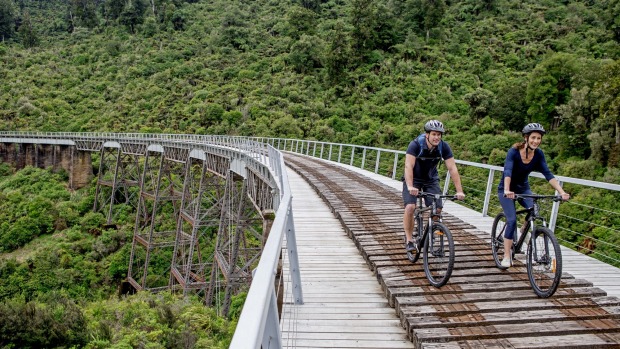It's not easy being beautiful: New Zealand tourism boom comes at a cost, Kiwis say

New Zealand is nature's playground but is it being overrun?
New Zealand's special brand of beauty is a double-edged sword to many, with one in five Kiwis saying they are worried that the country's magnetism to tourists is ruining what sets it apart.
The tourism industry's 100 per cent Pure marketing campaign, playing on the worldwide success of The Lord of the Rings and Hobbit movies, has been an unabashed success, according to an AAP report.
Some 3.5 million tourists made their way to our remote little islands of 4.5 million in 2015 - a 12 per cent increase on the number the previous year.
The country's winning blend of epic scenery, decent weather and friendly, English-speaking people is expected to continue to pull in the crowds, with visitor numbers expected to grow 5.4 per cent annually to reach 4.5 million by 2022.
READ MORE:
The road well-travelled: The rise and rise of New Zealand tourism
Tourism New Zealand: We're open for business all year round
New Zealand's Great Walks launch on Google Maps

Many Kiwis are worried that popular hiking and biking trails are becoming overcrowded.
But not everyone's happy about it. A recent survey by Tourism New Zealand found that about a fifth of locals think the country is attracting too many tourists, the report stated, with road accidents, traffic congestion, overcrowding, insufficient infrastructure and environmental impacts cited as chief concerns.
Jay Finlayson, vice-president of Federated Mountain Clubs, a national association of climbing and tramping clubs, said in a recent blog post that many holidaying Kiwis will be witness to the downsides of booming tourism this summer.
"Its impacts on infrastructure are obvious; roads, carparks, campsites, conservation honey pots, even recreation access across private land, all are creaking under the load, much of which is down to sheer numbers," Finlayson said.

New Zealand's 100 per cent pure image is a mixed blessing for some.
Greater competition for popular holiday and camping spots and more boots on once peaceful hiking trails, particularly the nine Great Walks maintained by the Department of Conservation (DOC), are also irking many.
Wellington resident Karen Fisher, who did two of the Great Walks over Christmas, alongside thousands of tourists, was cited saying that "Because of the easy accessibility and the numerous day trip tours available, the tracks in the Abel Tasman National Park were very crowded during the day".
Huts are now booked months in advance and camp sites along trails are becoming increasingly scarce, forcing many to hike for longer.

A McKinsey report suggests charging a hiking fee for the Great Walks.
There is growing resentment that New Zealand taxpayers are having to pick up the bill for mounting costs for infrastructure, waste removal, cleaning camp grounds and other expenses.
A report by international consultancy firm McKinsey found that DOC covers just five per cent of its costs on average from user pays, markedly lower than the some 20 per cent for national parks in Australia, the US and Canada.
The report, commissioned by various tourism sector and other stakeholders, suggested funding options such as a hiking fee for the Great Walks, a conservation tax for tourists, parking charges at popular spots and privatising the walks.
Tourism Minister Paula Bennett was cited saying that DOC is exploring options with the tourism sector and other stakeholders.
"No decisions have been made but a number of options for alternative funding are being considered, such as differential fees for international and domestic visitors," she added.
In Finlayson's view, New Zealand's tourism strategy should be "based on principles that prioritise us, our home here, and our long-term future".
"Our national identity is tied up in Aotearoa's hills, where the cash economy barely registers," he later added.
"It's a place of nature on nature's terms, egalitarian and healthy, a place of adventure, food-gathering, camaraderie, and many stories. New Zealanders' relationships with and within the great outdoors should unquestionably be safeguarded."
- Stuff
Comments